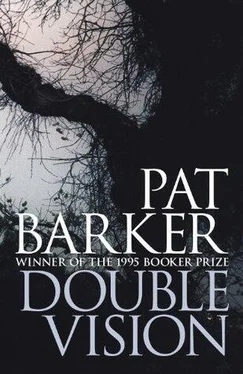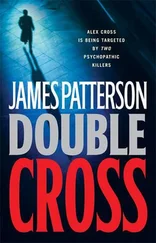Christmas was over. Feeling a slightly shamefaced pleasure in the restoration of normality, Kate stripped the tree of lights and decorations, cut off the main branches and dragged the trunk down to the compost heap at the bottom of the garden. There she stood looking back at the house, empty again now — her mother and sister had left the morning after Boxing Day — seeing the lighted windows and reflected firelight almost as if she were a stranger, shut out. A few specks of cold rain found her eyelids and mouth. All around her the forest waited, humped in silence. Shivering, she ran back up the lawn.
Gradually she re-established her routine. Up early, across to the studio by eight, five hours’ unbroken work that generally left her knackered for the rest of the day, though she forced herself to walk for an hour or two in the afternoons.
The weather turned colder, until one day, returning from her walk, she noticed that the big puddle immediately outside her front gate was filmed with ice, like a cataract dulling the pupil of an eye. She heated a bowl of soup, built up the fire and huddled over it, while outside the temperature dropped, steadily, hour by hour, until a solitary brown oak leaf detaching itself from the tree fell on to the frost-hard ground with a crackle that echoed through the whole forest.
People had glutted themselves on food and sociability over Christmas and New Year and wanted their own firesides, so the first few evenings of January were spent alone. But then Lorna and Michael Bradley asked her to their anniversary party and, though she was enjoying the almost monastic rhythm of her present life, she accepted. Since Ben’s death that had been her only rule: to refuse no invitation, to acknowledge and return any small act of kindness — and it was working, she was getting through, she was surviving.
Once there, she enjoyed the evening, in spite of having restricted herself to just two glasses of wine, and by eleven was driving back along the forest road, her headlights revealing the pale trunks of beech trees, muscled like athletes stripped off for a race. She was leaving a stretch of deciduous forest and entering Forestry Commission land, acres of closely planted trees, rank upon rank of them, a green army marching down the hill. Her headlights scarcely pierced the darkness between the pines, though here and there she glimpsed a tangle of dead wood and debris on the forest floor. She kept the windows closed, a fug of warmth and music sealing her off from the outside world. The lighted car travelled along the road between the thickly crowding trees like a blood corpuscle passing along a vein. Somewhere in the heart of the wood an antlered head turned to watch her pass. Almost no traffic — she overtook a white van near the crossroads, but after that saw no other cars. The road dipped and rose, and then, no more than 400 yards from her home, where a stream overflowing in the recent heavy rains had run across the road forming a slick of black ice, the car left the road.
There was no time to think. Trees loomed up, leapt towards her, branches shattered the windscreen, clawed at her eyes and throat. A crash and tearing of metal, then silence, except for the tinny beat of the music that kept on playing. One headlight shone at a strange angle, probing the thick resin-smelling branches that had caught and netted the car.
She lay, drifting in and out of consciousness, aware that she mustn’t try to move her head and neck. She knew she was injured, perhaps seriously, though she felt little pain as long as she kept still. Saliva dribbled from the corner of her mouth, blood settled in one eye.
After what seemed a long time she heard the noise of an engine. Her own wrecked car filled with shifting parallelograms of light and shade as the other car’s headlights swept across it. The engine was switched off, footsteps rang clear on the road, slurred across the grass verge, and then a figure appeared at the window. A headless figure was all she could see, since he didn’t bend to look in. She tried to speak, but only a croak came out. He didn’t move, didn’t open the door, didn’t check to see how she was, didn’t ring or go for help. Just stood there, breathing.
She tried to lift her head, but a spasm of pain shot down her spine and she knew she mustn’t move. Slowly she slipped into unconsciousness, fighting all the way, then battled her way back to the surface, where now there were other voices, frightened voices — frightened of her, of what she’d become.
‘Ambulance,’ she heard. ‘Police.’
Then the familiar sound of somebody thumbing numbers into a mobile phone, and at last she was able to let go and accept the dark.
In something too high, too tight, for a bed. White sheets pinned her legs down. Walls the colour of putty. Mum’s voice, then Alice’s, but she knew they couldn’t be here, they’d left the day after Boxing Day, and so she refused to acknowledge them, these phantom relatives, and concentrated instead on getting some spit going in her mouth. Her tongue felt swollen, and was so dry it stuck to the roof of her mouth.
‘Look,’ said Alice. ‘She wants a drink.’
Her mother’s head came between her and the light. ‘Dead to the world. Can’t hear a word you’re saying.’
‘Oh, I don’t know. They always say, don’t they, “Keep talking”? You never know how much gets through.’
Was she dying? Couldn’t persuade herself it mattered much.
Water …
Alice’s scent, sharp and sweet. A spout pushed between her lips, jarred her teeth. Water, too much water, gagged, choked, spout pulled away, reinserted, gentler now, and she glugged, once, twice. Dribbles ran down the side of her neck, were dabbed away on a cold flannel. She stared at the cracks in the ceiling, only to find them replaced, almost immediately, by her mother’s and her sister’s heads.
‘Do you think she can hear us?’ Mum said.
She has been somewhere else. She remembers the trees, the dark road, the branches pushing through broken glass, the man by the window, breathing. But then it all begins to fade.
She tried to turn her head and couldn’t. Some kind of brace round her neck stopped her moving. Her right arm was swaddled against her side by the tight sheet. She could feel her arms, and her legs, and her toes. She wiggled them to make sure, remembering how her father, right at the end of his long illness, after the stroke, had hated the arm he couldn’t feel and kept pushing it away from him. At least she wasn’t like that. It all still belonged to her, this barren plain she looked down on from the height of her raised head, this fenland under its covering of snow.
She started to drift off again, heard her mother say, ‘We’re only tiring her. I think we’d better go and let her sleep.’
Somebody had sent roses. She opened her eyes and there they were, tight, formal, dark red buds, like drops of blood in the white room, but her eyelids were too heavy to go on looking, and when she opened them again the roses were gone.
*
As soon as she could support herself, they got her out of bed and made her sit in the armchair beside it. Her feet were cold. She was depressed, worried about the work she wasn’t doing. She’d taken on a big commission, a huge Christ for the cathedral, it should have been well on the way by now, and yet here she was, stuck in an armchair like an old woman, unable to move, helpless.
The physiotherapist came to see her, and then she started regular sessions in the physiotherapy room, where she stared in the floor-to-ceiling mirrors at the neckless creature she’d become. ‘Very good,’ the uniformed girls kept saying. ‘Very good.’ She hadn’t been spoken to in such jolly, patronizing tones since she was in nappies. She smiled, desperation simmering under the surface.
Читать дальше












